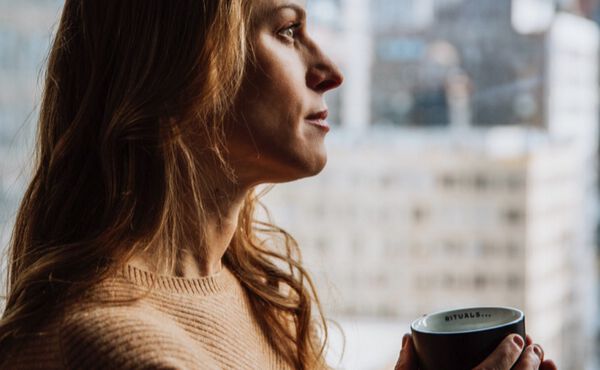From knowing the perfect time to exercise to when to cut the caffeine, today’s masterclass reveals the essential daily habits to set you up to fall asleep faster.
ARTICLE: HOW TO STRUCTURE YOUR DAY TO HELP YOU FALL ASLEEP AND ENJOY BETTER SLEEP AT NIGHT
“By making a few changes to your day, you will get a better night’s sleep,” says Dr Shelby Harris. “But don’t get hyper focused on exact timings of what you’re doing when. Healthy sleep is about consistency and making it a natural routine.”
We know it's nearly impossible to fall asleep instantly every night, but follow our simple daytime routine to help you improve your sleep quality, ramp up your sleep efficiency and to help you fall asleep faster come bedtime.
1. WAKE UP - ALWAYS AT THE SAME TIME
A sleep routine is key if you're having trouble sleeping and that includes what time you set your morning alarm for. Keeping a consistent wake time 7 days a week will improve your sleep at night and help you fall asleep. Try not to hit snooze, stay awake and you'll feel better in the long run.
2. IMMEDIATELY - SEEK LIGHT
You might not think the morning plays much part in the goal of falling asleep faster come the nighttime, but you would be surprised. Our internal body clock, or circadian rhythms, are ‘set’ by light and dark, so as soon as you wake, open the shades and find light. If it’s dark outside, put the lights on. Light boxes or dawn stimulators can be really helpful with this too.
3. 10 MINS AFTER WAKING - MORNING MINDFULNESS
Your bed is only for sleep, so to motivate you to get up, start your day with a 30 minute mindfulness session, this could be a meditation, some breathing exercises or some light yoga. It’s a great way to help focus on the present moment. Aim for just a few minutes to begin with, working your way up to more.
4. 8HRS BEFORE BED - CUT THE CAFFEINE
If you want to fall asleep faster and improve sleep, you need to start thinking about it long before your head hits the pillow. Enjoy your coffee in the morning. You should aim to stop your caffeine intake about 8 hours before bed and be aware of ‘hidden’ caffeine in things like painkillers.
5. 8HRS BEFORE BED - POWER NAP
If you need to take a nap, this is the only time to do it and it can’t be more than 20 minutes long. Any longer and your chances of having difficulty falling asleep will soar.
6. 4-6HRS BEFORE BED - WORKOUT
If restful sleep is the goal, this is the ‘sweet spot’ of when to exercise. A good sleeper’s body temperature naturally falls just before bed time. This temperature drop releases the hormone melatonin, which makes us feel sleepy helping us to fall asleep.
By exercising in this time frame, you’re raising your body temperature so it will fall naturally, encouraging the natural sleep signal.
7. 3HRS BEFORE BED - EARLY-BIRD DINNER
Our bodies can’t digest a big meal just before bed so try and eat three hours before if you want to fall asleep fast. You may need to change your schedule and have a bigger meal earlier in the day and a snack before bed.
8. 3HRS BEFORE BED - THINK ABOUT DRINK
Alcohol drastically affects your quality of sleep so avoid it three hours before bed. And of course, the more liquid you drink, the more likely you’ll need the bathroom. A good rule for sleep health is 1 cup of liquid within three hours of bedtime and empty your bladder before going to sleep.
9. 2HRS BEFORE BED - TAKE A BATH
It might seem like a good idea to have a warm bath or shower before bed, but a good sleeper’s internal temperature lowers just before going to sleep, so allow enough time for your body temperature to drop if you want to fall asleep fast. For muscle relaxation, soak in magnesium, try our The Ritual of Jing magnesium bath crystals with a hint of soothing lavender.
10. 1HR BEFORE BED - HAVE A ‘WORRY MOMENT’
Want to fall asleep faster? Have a 'worry moment' - a dedicated 20 minutes to sit down and write a list of things that are worrying you. Set a timer, write everything down and as soon as it’s up, your worry moment is over. Trust us, it will set you up for a good night's sleep.
11. 30MINS BEFORE BED - CREATE THE PERFECT SLEEP ENVIRONMENT
Feel relaxed and set yourself up for a good night's rest by setting the scene with a little bedtime routine. Limit sleep disturbances and enjoy a deeper sleep during the night by wearing an eye mask to block out unwanted light and, if noise tends to wake you up, pop in some earplugs. Keep the bedroom temperature at between 60 to 67 degrees Fahrenheit (15.6 to 19.4 degrees Celsius) as this will promote sleep. Finally mist your pillow with a sleep spray like The Ritual of Jing Pillow & Body Mist with calming lavender to relax your nervous system to help you drift off.

MEDITATION: A YOGA NIDRA MEDITATION FOR A QUIETER MIND
Many of us struggle with a racing mind when we’re trying to fall asleep. Yoga expert Deborah Quibell helps you put those racing thoughts to bed with this guided yoga nidra meditation. Also known as “yogic sleep,” nidra is often used in yoga classes to reach that deeply relaxing state of consciousness between waking and sleeping. Use this soothing session whenever you need it to fall asleep, especially after a hectic day to still your mind and signal downtime. Why not light a candle to create a relaxing scene, take some deep breaths before you begin and finish with some relaxing music?
PODCAST: UNDERSTANDING YOUR BODY CLOCK
Your body clock determines when you go to sleep and when you wake up. Listen to today’s podcast to discover simple tweaks to reset it, and ensure you’re sleepy at bedtime and refreshed when you rise.
Ready for your next day of our Sleep Masterclass? Click here!
-
Promotions
Visualizza i dettagli completi€ 18,32 € 22,90
.jpg?sw=1440&sh=445&sm=fit&cx=0&cy=0&cw=1440&ch=445&sfrm=jpg)


.jpg?sw=600&sh=370&sm=fit&cx=0&cy=0&cw=600&ch=370&sfrm=jpg)
.jpg?sw=600&sh=370&sm=fit&cx=0&cy=0&cw=600&ch=370&sfrm=jpg)
.jpg?sw=600&sh=370&sm=fit&cx=0&cy=0&cw=600&ch=370&sfrm=jpg)
.jpg?sw=600&sh=370&sm=fit&cx=0&cy=0&cw=600&ch=370&sfrm=jpg)
